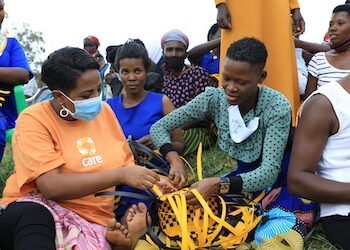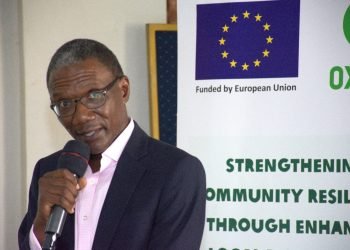-
Today, the Uganda national NGO forum organized a breakfast meeting in Kampala in partnership with CARE Uganda to discuss the theme: re-imagining Quality Assurance Mechanism (QuAM). The meeting aimed to address the emerging opportunities and challenges of QuAM in development and humanitarian efforts, particularly the shift from international organizations (INGOs) dominating the system to local actors taking the lead.
-
Under the Development Initiative for Northern Uganda (DINU), a Government of Uganda programme supported by the EU and supervised by OPM, Care Denmark received a grant in 2020 to implement a project, “Inclusive Market-based Development for Smallholder Farmers in Northern Uganda.”
-
CARE International in Uganda has received instruments of power as the coordinating agency of the Charter for Change (C4C) Working Group in Uganda. Michael Tugyetwena, CARE's Operations Director received the instruments from Henry Muyanja, the Executive Director Street Child, (the outgoing coordinating agency) in a modest coordination role handover event held at CARE Head Office in Kampala on January 11th, 2022.
-
CARE International in Uganda in partnership with Innovation Norway and DANIDA recently launched a plastic recycling plant and three community solar kitchens expected to serve about 50 households per village in Kyangwali refugee settlement in Kikuube District. The kitchens installed at the different women’s safe spaces will reduce both deforestation and female exposure to gender-based violence experienced during collection of firewood.
-
A partnership between the PepsiCo Foundation - the philanthropic arm of one of the world's leading food and beverage companies, and CARE – a global humanitarian organisation, has improved the food and nutrition security of thousands of poor, rural households in Kyenjojo and Kyegegwa districts in Uganda.
-
Margaret's story and several others were shared with the CARE International in Uganda Country Director, Apollo Gabazira during a three-day visit to the DINU programme sites in Karamoja and Acholi sub-regions
-
In response to the changing contextual issues around the COVID-19 pandemic, CARE International in Uganda's Women Adolescents and Youth (WAY) rights empowerment programme with funding from UNFPA developed key strategies to support field programming.
-
Many businesses, large and small, have a huge source of great ideas that can help them improve, innovate, and grow, and yet so many of these companies never think of using this amazing corporate asset. What is this highly valuable asset? Its own people.
-
A collection of stories featuring Ugandan women in celebration of International Women's Day 2021
-
16 Days of Activism against Gender-Based Violence 2020 with the theme: "Orange the World: Fund, Respond, Prevent, Collect!"
-
GOMA, (June 24, 2019) - The Ebola outbreak in the Democratic Republic of Congo (DRC) has now killed more than 1,500 people and infected over 2,200 since its onset last August. Lack of security in the locations where the virus has spread, which are also some of the country’s most densely populated areas, as well as limited community engagement in the response are main reasons why the epidemic has continued to spread.
-
On the occasion of World Refugee Day, 16 non-governmental organisations call for urgent action to prevent and mitigate the impact of environmental degradation around refugee settlements in Uganda.
-
Endorsed by: Oxfam, Action Against Hunger, Relief International, Humanity and Inclusion, Medical Team International, Catholic Relief Services, International Rescue Committee and CARE International.
-
Earlier this year, thousands of Congolese risked their lives to flee their conflict-ridden country and seek refuge in Uganda. Pema* is one of them. Despite the trauma of rape, fleeing and violence, she is now trying to rebuild her life together with her 10 children in Kyangwali refugee settlement in Uganda. Eager to help people with similar trauma, she became a volunteer with CARE.
-
Mafi* is holding her tiny newborn in her arms, as she puts her hand gently on her little tummy. What most people do not know is that a part of her daughter reminds her on her worst days in the Democratic Republic of Congo. Shortly before fleeing from home, four armed men had raped her. One of them is now the father of her child.
-
A surge in violent conflict and inter-communal tensions has forced more than 781,000 Congolese, many of them women and children, to flee their homes since 2017. The situation continues to deteriorate dramatically as escalating violence, particularly in the country’s eastern region, is causing an exodus in neighbouring countries.
-
Joint statement by 26 international NGOs in Uganda on the need for urgent action to address gaps in funding for the refugee response.
-
The humanitarian situation in the Democratic Republic of Congo (DRC) deteriorated dramatically in 2017, and the country is now facing a complex and protracted crisis of massive proportions. The number of people in need of assistance almost doubled in 2017 and is expected to increase in 2018.
-
Thousands of Congolese seeking refuge at settlements in south western Uganda are at risk of contracting cholera, warns the international aid organization CARE.
-
Majority of women have experienced or witnessed gender-based violence on their way to Uganda / Dead refugee bodies thrown into Lake Albert
-
More than 14,000 refugees, the large majority women and children, have fled the Democratic Republic of Congo (DRC) to Uganda since December 18th 2017, following increased conflict, according to figures from Government of Uganda and UNHCR, said agency CARE International.
-
Since violence erupted in South Sudan in 2016, the number of people who have fled to safety in Uganda has exceeded one million. Where some countries turn refugees away, the Ugandan Government is welcoming them. CARE’s Refugee Response Team Leader Carly Sheehan is in Uganda and shines a light on how, with support, refugees really can start again.
-
Since violence erupted in South Sudan in 2016, the number of people who have fled to safety in Uganda has exceeded one million. Where some countries turn refugees away, the Ugandan Government is welcoming them. CARE’s Refugee Response Team Leader Carly Sheehan is in Uganda and shines a light on how, with support, refugees really can start again.
+256 31 2258100
Email us info@careuganda.org
5th Floor, Union House, Plot 78, Luthuli Avenue, Kampala
























